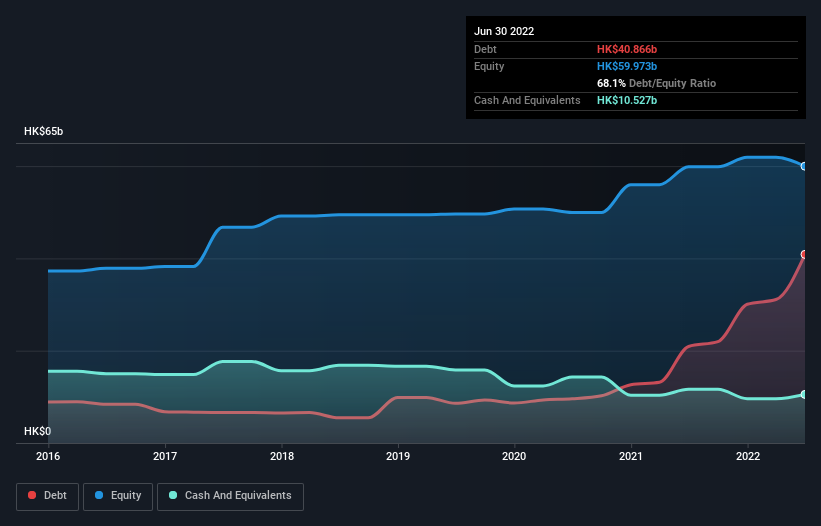- Hong Kong
- /
- Water Utilities
- /
- SEHK:270
We Think Guangdong Investment (HKG:270) Is Taking Some Risk With Its Debt

David Iben put it well when he said, 'Volatility is not a risk we care about. What we care about is avoiding the permanent loss of capital.' So it seems the smart money knows that debt - which is usually involved in bankruptcies - is a very important factor, when you assess how risky a company is. Importantly, Guangdong Investment Limited (HKG:270) does carry debt. But should shareholders be worried about its use of debt?
When Is Debt A Problem?
Debt and other liabilities become risky for a business when it cannot easily fulfill those obligations, either with free cash flow or by raising capital at an attractive price. Part and parcel of capitalism is the process of 'creative destruction' where failed businesses are mercilessly liquidated by their bankers. However, a more common (but still painful) scenario is that it has to raise new equity capital at a low price, thus permanently diluting shareholders. By replacing dilution, though, debt can be an extremely good tool for businesses that need capital to invest in growth at high rates of return. The first thing to do when considering how much debt a business uses is to look at its cash and debt together.
See our latest analysis for Guangdong Investment
How Much Debt Does Guangdong Investment Carry?
The image below, which you can click on for greater detail, shows that at June 2022 Guangdong Investment had debt of HK$40.9b, up from HK$20.9b in one year. On the flip side, it has HK$10.5b in cash leading to net debt of about HK$30.3b.

A Look At Guangdong Investment's Liabilities
Zooming in on the latest balance sheet data, we can see that Guangdong Investment had liabilities of HK$32.8b due within 12 months and liabilities of HK$41.4b due beyond that. On the other hand, it had cash of HK$10.5b and HK$7.01b worth of receivables due within a year. So its liabilities total HK$56.7b more than the combination of its cash and short-term receivables.
Given this deficit is actually higher than the company's market capitalization of HK$45.9b, we think shareholders really should watch Guangdong Investment's debt levels, like a parent watching their child ride a bike for the first time. Hypothetically, extremely heavy dilution would be required if the company were forced to pay down its liabilities by raising capital at the current share price.
We use two main ratios to inform us about debt levels relative to earnings. The first is net debt divided by earnings before interest, tax, depreciation, and amortization (EBITDA), while the second is how many times its earnings before interest and tax (EBIT) covers its interest expense (or its interest cover, for short). Thus we consider debt relative to earnings both with and without depreciation and amortization expenses.
Guangdong Investment's net debt is 3.2 times its EBITDA, which is a significant but still reasonable amount of leverage. However, its interest coverage of 22.0 is very high, suggesting that the interest expense on the debt is currently quite low. Notably Guangdong Investment's EBIT was pretty flat over the last year. We would prefer to see some earnings growth, because that always helps diminish debt. The balance sheet is clearly the area to focus on when you are analysing debt. But it is future earnings, more than anything, that will determine Guangdong Investment's ability to maintain a healthy balance sheet going forward. So if you want to see what the professionals think, you might find this free report on analyst profit forecasts to be interesting.
Finally, while the tax-man may adore accounting profits, lenders only accept cold hard cash. So we always check how much of that EBIT is translated into free cash flow. During the last three years, Guangdong Investment burned a lot of cash. While investors are no doubt expecting a reversal of that situation in due course, it clearly does mean its use of debt is more risky.
Our View
We'd go so far as to say Guangdong Investment's conversion of EBIT to free cash flow was disappointing. But at least it's pretty decent at covering its interest expense with its EBIT; that's encouraging. We should also note that Water Utilities industry companies like Guangdong Investment commonly do use debt without problems. Overall, we think it's fair to say that Guangdong Investment has enough debt that there are some real risks around the balance sheet. If everything goes well that may pay off but the downside of this debt is a greater risk of permanent losses. The balance sheet is clearly the area to focus on when you are analysing debt. But ultimately, every company can contain risks that exist outside of the balance sheet. To that end, you should learn about the 2 warning signs we've spotted with Guangdong Investment (including 1 which is a bit unpleasant) .
If you're interested in investing in businesses that can grow profits without the burden of debt, then check out this free list of growing businesses that have net cash on the balance sheet.
New: Manage All Your Stock Portfolios in One Place
We've created the ultimate portfolio companion for stock investors, and it's free.
• Connect an unlimited number of Portfolios and see your total in one currency
• Be alerted to new Warning Signs or Risks via email or mobile
• Track the Fair Value of your stocks
Have feedback on this article? Concerned about the content? Get in touch with us directly. Alternatively, email editorial-team (at) simplywallst.com.
This article by Simply Wall St is general in nature. We provide commentary based on historical data and analyst forecasts only using an unbiased methodology and our articles are not intended to be financial advice. It does not constitute a recommendation to buy or sell any stock, and does not take account of your objectives, or your financial situation. We aim to bring you long-term focused analysis driven by fundamental data. Note that our analysis may not factor in the latest price-sensitive company announcements or qualitative material. Simply Wall St has no position in any stocks mentioned.
About SEHK:270
Guangdong Investment
An investment holding company, engages in water resources, property investment and development, department store operation, hotel ownership, energy project operation and management, and road and bridge operation businesses.
Good value with adequate balance sheet and pays a dividend.

